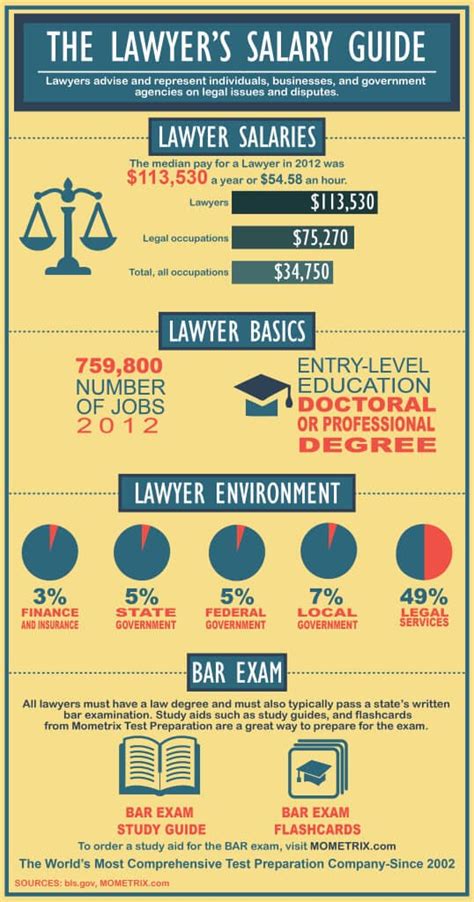Are you considering a career in law but wondering about the financial aspect of it? The legal profession is often associated with high earning potential, but what are the realities behind lawyer salaries? In this blog post, we will delve into the truth about lawyers’ earnings, exploring the average salaries you can expect, the factors that influence these earnings, and the impact of education, experience, and specialization. We will also reveal the top-paying legal practice areas and how geographical location and law firm size can determine earnings. Additionally, we will discuss the gender pay gap in the legal profession and provide salary negotiation strategies for aspiring and practicing lawyers. By the end of this post, you will have a comprehensive understanding of the financial aspects of a career in law and be better equipped to make informed decisions about your professional future.
Table of Contents
Average salaries of lawyers: What to expect
When considering a career in law, one of the most pressing questions on the mind of prospective lawyers is the earning potential. The average salaries of lawyers can vary greatly depending on a number of factors, and it’s important to have an understanding of what to expect in terms of compensation.
First and foremost, education and experience play a significant role in determining a lawyer’s salary. Those with advanced degrees from prestigious law schools and several years of experience in the field can command higher salaries than their less qualified counterparts.
Another key factor that influences lawyer salaries is specialization. Attorneys who specialize in high-demand areas such as healthcare law, intellectual property, or corporate law tend to earn more than those in other practice areas.
Furthermore, geographical location can also be a determinant of earnings. Lawyers practicing in major metropolitan areas or areas with a high cost of living often earn higher salaries compared to those in rural or less affluent areas.
Factors that influence lawyer salaries
One of the key factors that influence lawyer salaries is the level of experience in the legal field. Typically, the more years a lawyer has been practicing, the higher their earning potential. This is because experience often leads to a deeper understanding of the law, better client relationships, and more successful case outcomes. As a result, law firms and corporate legal departments are willing to pay higher salaries to experienced attorneys who can bring valuable expertise to their organizations.
Another important factor in determining lawyer salaries is the specialization of the attorney. Certain areas of law, such as corporate law and intellectual property law, are known for being higher-paying specialties than others, such as family law or immigration law. Lawyers who choose to specialize in these more lucrative areas can often command higher salaries due to the specialized knowledge and skill set required for these types of cases.
Geographical location also plays a significant role in influencing lawyer salaries. In major cities and regions with a high cost of living, legal professionals often earn higher salaries to accommodate the higher expenses associated with living in these areas. On the other hand, lawyers practicing in rural or less expensive areas may find that their earning potential is lower due to the lower cost of living and reduced demand for legal services.
Finally, the size of the law firm or organization can have a significant impact on lawyer salaries. Large law firms and corporate legal departments often have more resources available to offer higher compensation packages to their attorneys, while smaller firms and organizations may have more limited budgets for salaries and bonuses. Additionally, the size of the firm can also affect the type and complexity of cases that lawyers handle, which can in turn impact their earning potential.
Education and experience: Impact on earnings
When it comes to the salaries of lawyers, education and experience play a crucial role in determining their earnings. A higher level of education, such as a master’s or doctorate degree, can significantly increase a lawyer’s earning potential. Additionally, the number of years of experience in the field also has a direct impact on their salary. As lawyers gain more experience, they are able to command higher fees for their services, leading to greater financial rewards.
Furthermore, the type of legal training received can also influence a lawyer’s earnings. Graduates from prestigious law schools or those with specialized certifications may have an advantage in the job market, allowing them to negotiate higher salaries. On the other hand, lawyers with limited or less-recognized educational backgrounds may face challenges in obtaining higher-paying positions.
In addition to education, the areas in which lawyers gain experience can also affect their earnings. Specializing in a lucrative area of law, such as corporate law or intellectual property, can lead to higher salaries compared to those working in less profitable legal sectors. Moreover, lawyers who have built a strong track record of success in their field are often able to command higher fees for their services, regardless of their educational background.
In conclusion, education and experience are integral factors that can significantly impact a lawyer’s earnings. Those who invest in advanced educational qualifications, gain valuable experience, and specialize in high-demand legal areas are more likely to enjoy higher salaries and financial rewards in the legal profession.
Specialization and its effect on salaries
Specializing in a particular area of law can have a significant impact on a lawyer’s earnings. Lawyers who choose to specialize in high-demand practice areas such as intellectual property law, corporate law, or tax law tend to command higher salaries compared to those in other fields.
Specialization allows lawyers to develop expertise and experience in a specific area, making them more valuable to clients and employers. This increased demand for specialized knowledge often translates to higher compensation, as clients are willing to pay a premium for the specialized skills and insights that a specialist can provide.
In addition to higher earning potential, specializing in a specific area of law can also lead to career advancement opportunities. Lawyers with specialized expertise are often sought after by prestigious firms and corporations, which can open doors to higher-paying positions and partnerships.
However, it’s important to note that the effect of specialization on salaries can vary depending on the current market demand for certain types of legal services. While some specialties may be highly lucrative at a given time, others may not offer the same earning potential. As such, it’s crucial for lawyers to stay informed about industry trends and the evolving needs of clients in order to capitalize on the benefits of specialization.
Top-paying legal practice areas: Revealed
When considering a career in law, it’s essential to be aware of the different practice areas and their earning potential. The legal field offers a wide range of specialties, each with its own unique set of challenges and rewards. However, some practice areas are known for being more lucrative than others, attracting lawyers who are motivated by financial incentives.
One of the top-paying legal practice areas is Corporate Law. Attorneys who specialize in corporate law often work for large, global law firms and multinational corporations, handling complex transactions and providing legal advice on business operations. Due to the high-stakes nature of corporate law, professionals in this field are well-compensated for their expertise and dedication.
Another lucrative practice area is Intellectual Property Law. Lawyers who focus on intellectual property law help clients protect their inventions, creative works, and trademarks. With the increasing importance of innovation and technology in today’s economy, intellectual property lawyers are in high demand, commanding high salaries due to their specialized skill set.
Furthermore, Tax Law is also among the top-paying legal practice areas. Tax attorneys advise individuals and companies on tax-related matters, ensuring compliance with laws and regulations while minimizing tax liabilities. Given the complexity of tax laws and the potential financial implications for clients, tax lawyers are well-compensated for their expertise and ability to navigate the intricacies of the tax code.
Geographical location: A determinant of earnings
When it comes to the salary of lawyers, one of the key factors that influence their earnings is the geographical location in which they practice. The legal profession is not immune to the impact of regional differences in cost of living and overall economic conditions.
For example, lawyers practicing in major metropolitan areas such as New York City, San Francisco, or Los Angeles tend to command higher salaries compared to those practicing in smaller cities or rural areas. This is largely due to the higher cost of living and increased demand for legal services in these urban centers.
On the other hand, lawyers working in rural areas or smaller towns may have lower earning potential, as the demand for legal services might be lower and the cost of living is often lower as well. This can result in a lower average salary for lawyers in these areas.
Furthermore, the geographical location can also impact the availability of certain legal practice areas. For example, lawyers specializing in entertainment law may find more opportunities and higher salaries in cities with a strong entertainment industry presence, such as Los Angeles or Nashville.
How law firm size affects lawyer pay
When it comes to the salaries of lawyers, the size of the law firm they work for plays a significant role in determining their pay. Larger law firms tend to offer higher salaries compared to smaller ones, largely due to their resources, client base, and the complexity of the cases they handle.
Law firm size directly impacts the earning potential of lawyers, with larger firms being able to afford higher compensation packages. This is because they handle high-profile cases, have a wider reach, and are often able to attract big corporate clients, which in turn leads to larger revenues and profits.
On the other hand, lawyers working for small or boutique law firms may earn less, as these firms typically have a smaller client base and may handle less complex cases. As a result, their salary may not be as competitive as those at larger law firms.
Furthermore, the type of law practiced at a firm can also influence lawyer pay. For example, a large corporate law firm may offer higher salaries than a small public interest law firm due to the nature of the cases and clients they represent. This further highlights the impact of law firm size on lawyer pay.
Corporate lawyers vs. public interest lawyers: Who earns more?
When it comes to the legal profession, there are different career paths that lawyers can take, each with its own unique set of advantages and disadvantages. One of the most significant differences in the legal field is the earning potential between corporate lawyers and public interest lawyers. Corporate lawyers, who work for private companies, often command higher salaries due to the nature of their work and the clients they serve.
On the other hand, public interest lawyers, who typically work for non-profit organizations or government agencies, may not earn as much as their corporate counterparts. This is because public interest lawyers often focus on serving underprivileged individuals or communities, and their work is typically funded by grants and donations, which may limit their earning potential.
Another factor that influences the earnings of corporate lawyers versus public interest lawyers is the demand for their services. Corporate lawyers are often in high demand, especially in major business centers, which allows them to charge higher billing rates. Conversely, public interest lawyers may struggle to find consistent, well-paying work, as funding for non-profit legal work can be unpredictable and subject to budget cuts.
While there is a significant disparity in the earning potential between corporate lawyers and public interest lawyers, it’s important to note that both career paths have their own unique rewards. Corporate lawyers may enjoy higher salaries and more financial stability, while public interest lawyers may find a deeper sense of purpose and fulfillment in their work.
The gender pay gap in the legal profession
When it comes to the legal profession, the gender pay gap is a significant issue that continues to be a point of contention. Women in the legal field often find themselves earning less than their male counterparts, despite having the same level of education and experience. This disparity is a reflection of the larger societal issue of gender inequality, and it has far-reaching implications for the legal profession as a whole.
In many cases, the gender pay gap in the legal profession can be attributed to the fact that women are underrepresented in higher-paying positions within law firms and other legal organizations. Women often face barriers when it comes to advancing to leadership positions, which in turn affects their earning potential. Additionally, there is evidence to suggest that women are less likely to negotiate for higher salaries than men, which further perpetuates the pay gap.
Addressing the gender pay gap in the legal profession requires a multifaceted approach. Law firms and organizations must work to create more equitable opportunities for women to advance in their careers and earn fair compensation for their work. Additionally, there needs to be greater transparency around salary information and promotion opportunities to ensure that women are not being unfairly disadvantaged.
Ultimately, closing the gender pay gap in the legal profession is not just a matter of fairness, but also a strategic imperative for the entire legal industry. By ensuring that women are able to thrive and succeed in the legal profession, the industry as a whole stands to benefit from a more diverse and inclusive workforce.
Salary negotiation strategies for lawyers
When it comes to negotiating a salary as a lawyer, there are a few key strategies that can help you secure the pay you deserve. One important strategy is to research the average salary for lawyers in your area, taking into account your level of experience and specialization. This will give you a good starting point for negotiations and ensure that you are not underselling yourself.
Another essential strategy is to highlight your unique skills and accomplishments during the negotiation process. Emphasizing any specialized knowledge or successful case outcomes can help demonstrate your value to potential employers and justify a higher salary.
It’s also important to approach salary negotiations with confidence and professionalism. Being well-prepared and knowledgeable about your worth as a lawyer will show employers that you are serious about your career and that you are not willing to settle for less than what you deserve.
Finally, it’s crucial to be open to compromise during salary negotiations. While it’s important to advocate for fair compensation, flexibility and willingness to find a mutually beneficial solution can go a long way in reaching a successful negotiation outcome.





